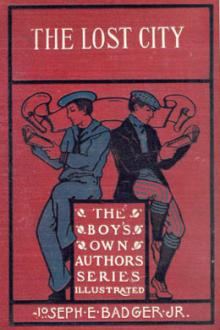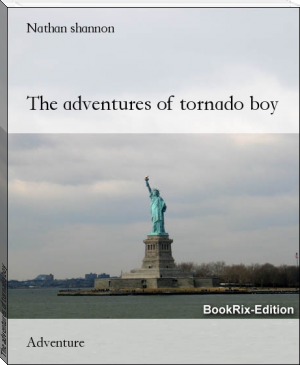The Lost City - Jr. Joseph E. Badger (children's books read aloud txt) 📗

- Author: Jr. Joseph E. Badger
- Performer: -
Book online «The Lost City - Jr. Joseph E. Badger (children's books read aloud txt) 📗». Author Jr. Joseph E. Badger
course, they must be totally ignorant of all such things as
flying-machines and the like.”
“Poor, ignorant devils!” sympathetically sighed the youngster.
“Well, we’ll have to do a little missionary work in this quarter,
before taking our departure, eh, uncle Phaeton?”
With a start, Featherwit descended out of the clouds in which he
had been lost ever since winning a fair view of the secret city;
and now, rallying his wits and fairly aglow with eager interest
in this marvellous discovery, he began pointing out the various
objects of special importance, naming them with glib assurance,
then reminding the boys how wonderfully similar all was to what
had existed in Old Mexico before the conquest.
Bruno listened with greater interest than his brother could
summon at will. For one thing, he had long been a lover of the
genial Prescott, and, now that his memory was freshened in part,
was able to closely follow the course of that little lecture,
noting each strong point made by the professor in bolstering up
his delightful theory.
That monologue, however, was abruptly broken in upon by Waldo,
who gave an eager exclamation, as he reached forth a pointing
finger:
“Look! There’s a white woman yonder,—two of ‘em, in fact!”
CHAPTER XVI.
CAN IT BE TRUE?
That announcement came with all the force of a bolt from the
blue, and even the professor dropped his glasses with a gasp of
amazement, while Bruno would have leaped to his feet, only for
the hasty grab which his brother made at the tail of his coat.
“White—where? Surely it cannot be that—Edgecombe—”
“Augh, take a tumble, boy!” ejaculated Waldo, giving a jerk that
rendered compliance nearly literal, though scarcely full of
grace. “Want to have the whole gang make a howling break this
way? Want to—They’re white all right, though!”
“Where? Which direction? Point them out, and—I fail to see
anything which would bear out your—”
The professor was sweeping yonder field with his glass, searching
for the primal cause of that latest excitement, but without
success. No sign of a white face, male or female, rewarded his
efforts, and he turned an inquiring gaze upon the youngster.
Waldo was peering from beneath the shade of his hand, but now
drew back with a long breath, to slowly shake his head.
“They’ve gone now, but I did see them, and they were white, just
as white as—as anything!”
Bruno frowned a bit at that unsatisfactory conclusion, but the
professor was of more equable temper, for a wonder. He smilingly
shook his head, while gazing kindly, then spoke:
“I myself might have made the same error, Waldo, but you surely
were in error, for once.”
“What! You mean I never saw those white women, uncle Phaeton?”
“No, no, I am not so seriously faulting your eyesight, my dear
boy,” came the swift assurance. “But even the best of us are
open to errors, and there were in olden times not a few Aztecs
with fair skins; not exactly white, yet comparatively fair when
their race was considered. And, no doubt, Waldo, you saw just
such another a bit ago.”
But the youngster was not so easily shaken in his own opinion.
“There were a couple of ‘em, not just such another, uncle. And
they were white,—pure white as ever the Lord made a woman!
And—why, didn’t I see their hair, long and floating loose? And
wasn’t that yellow as—as gold, or the sunshine itself?”
“Yellow hair?”
“Yes, indeedy! Yellow hair, white skins,—faces, anyway.
Blondes, the couple of ‘em; and to that I’ll make my davy!”
And so the youngster maintained with even more than usual
sturdiness, when questioned more closely, pointing out the very
spot upon which the strange beings were standing, the top of a
large, tall building, clearly one of the series of temples.
In vain the field-glass was fixed upon that particular point.
The partly roofed azotea was wholly devoid of human life, and
though watch was maintained in that direction for many minutes
thereafter, by one or other of the air-voyagers, naught was seen
to confirm the assertion made by the younger Gillespie.
For the moment that fact or fancy dominated all other interests,
for, granting that Waldo had not been misled by a naturally fair
Indian face, there was room for a truly startling inference.
“Could it actually be they?” muttered Bruno, face pale and eyes
glittering with intense interest. “Could they have escaped with
life from the balloon, and been here ever since?”
“You mean—”
“The wife and child of Cooper Edgecombe,—yes! Who else could
they be, unless—I’d give a pretty penny for one fair squint at
them, right now! If there was only some method of—It would
hardly do to venture down yonder, uncle Phaeton?”
The professor gave a stern gesture of denial, frowning as though
he anticipated an actual break for yonder town, in spite of the
odds against them.
“That would be madness, Bruno! Worse than madness, by far! Look
at yonder warriors, all thoroughly armed, and eager to drink
blood as ever they were in centuries gone by! They are hundreds,
if not thousands, while we are but three! Madness, my boy!”
“Four, with Mr. Edgecombe, uncle.”
“And that means a complete host so long as we are backed up by
the air-ship,” declared Waldo, in his turn. “Those fellows!”
with a sniff of true boyish scorn for aught that was not fully up
to date. “What could they do, if we were to open fire on them
just once?”
“Prove our equals, man for man, armed as they assuredly are,”
just as vigorously affirmed the professor, inclined rather to
magnify than diminish the importance of these, his so recently
discovered people. “You forget how the Aztecans fought Cortez
and his mailed hosts. Yet these are one and identical, so far as
valour and training and blood can go.”
“Huh! Scared of a runty horse so badly that they prayed to ‘em
as they did to their own gods!” sniffed Waldo, betraying a lore
for which he did not ordinarily receive fair credit. “Why, uncle
Phaeton, let you just slam one o’ those dynamite shells inside a
chief—”
“Nay, Waldo, must I repeat, we are not here for the purpose of
conquest, unless by purely amicable methods. There must be no
fighting, for or against. Savages though most people would be
inclined to pronounce yonder race, they are human, with souls
and—”
“But I always thought they were heathens, uncle Phaeton?”
The professor subsided at that, giving over as worse than useless
the attempt to enlighten the irrepressible youngster, at least
for the time being.
Silence ruled for some little time, during which each one of the
trio kept keen watch over the valley, the field-glass changing
hands at intervals in order to put all upon an equal footing.
One thing was clear enough unto all: the Indians had been
greatly wrought up by the brief appearance of some queerly shaped
monster of the air, and while a goodly number of their best
warriors had hastened out of the valley and up the difficult
passes, in hopes of learning more, still others were astir,
weapons in hand, evidently determined to defend their lives or
their property from any assault, should such be made, whether by
known or foreign adversaries.
This busy stir and bustle, combined with the novel architecture
and so many varying points of interest, would have been a mental
and visual feast for the trio of air-voyagers, only for that one
doubt: were white captives actually in yonder temple? And, if
white, were they the long-lost relatives of the aeronaut, Cooper
Edgecombe?
Quite naturally the interest displayed by the Indians centred in
the quarter of the heavens where that air-demon had been sighted,
hence our friends saw very little cause for apprehension on their
own parts.
Thus they were given a better opportunity for thinking of and
then discussing the new marvel.
Again did Waldo vow that his eyes had not befooled him. Again he
positively asserted that he had seen two white women, wearing
blonde hair in loose waves far adown their backs. And once again
Bruno, in half-awed tones, wondered whether or no they were the
mother and child borne away upon the wings of a mighty storm,
fifteen long years gone by.
“It is possible, though scarcely credible,” admitted uncle
Phaeton, in grave tones, as he wrinkled his brows after his
peculiar fashion when ill at ease in his mind. “Edgecombe lived
through just such another experience; though, to be sure, he was
a man of iron constitution, while they were far more delicate, as
a matter of course.”
“Still, it may have happened so?” persisted Bruno, taking a
strong interest in the matter. “You would not call it too
far-fetched, uncle?”
“No. It may have happened. I would rather call it marvellous,
yet still possible. And if so—”
“There is but a single answer to that supposition, uncle; they
must be rescued from captivity!” forcibly declared Bruno.
“That’s right,” confirmed Waldo. “Of course all women and
girls—I mean other people’s kin—are a tremendous sight of
bother and worry, and all that; but we’re white, and so are
they.”
“We must rescue them; there’s nothing else to do,” again
emphasised the elder Gillespie.
“That is no doubt the proper caper, speaking from your boyish
point of view, my generous-hearted nephews; but—just how?” dryly
queried the professor. “Have you arranged all that, as well,
Bruno?”
“You surely would not abandon them, uncle Phaeton?” asked the
young man, something abashed by that veiled reproof. “To such a
horrible fate, too?”
“A fate which they must have endured for fifteen years, provided
your theory is correct, Bruno,” with a fleeting smile. “Don’t
mistake me, lads. I am ready and willing to do all that a man of
my powers may, provided I see just and sufficient cause for
taking decisive action. That is yet lacking. We are not certain
that there are white women yonder. Or, if white women, that they
are captives. Or, if captives, that they would thank us for
aiding them to escape.”
“Why, uncle Phaeton! Think of Mr. Edgecombe, and how—”
“I am thinking of him, and I wish to think yet a little longer,”
quietly spoke the professor. “keep a lookout, lads, and if you
see aught of Waldo’s fair women, pray notify me.”
For the better part of an hour comparative silence reigned, the
boys feasting eyes upon yonder spectacle, their uncle deeply in
reverie; but then he roused up, his final decision arrived at.
“I will do it!” were his first words. “Yes, I will do it!”
“Do what, uncle Phaeton?” asked Waldo, with poorly suppressed
eagerness, as he turned towards his relative.
“Go after Cooper Edgecombe,—bringing him here in order that he
may, sooner or later, solve this perplexing enigma. Come, boys,
we may as well start back towards the aerostat.”
But both youngsters objected in a decided manner, Waldo saying:
“No, no, uncle Phaeton! Why should we go along? You’ll be
coming right back, and will be less crowded in the ship if we
don’t go.”
“And we can better wait right here; don’t you see, uncle?”
“To keep the Lost City safely found, don’t you know? What if it
should take a sudden notion to lose itself again?” added Waldo,
innocently.
CHAPTER XVII.
AN ENIGMA FOR THE BROTHERS.
In place of the indulgent smile for which he was playing, Waldo
received a frown, and directly thereafter the professor spoke in
tones which could by





Comments (0)